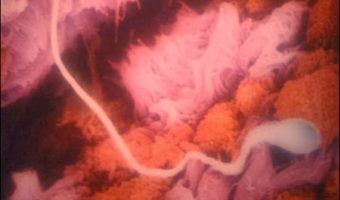Ferdinand Cheval, the Man Who Spent 33 Years Building a Palace with the Stones He Collected
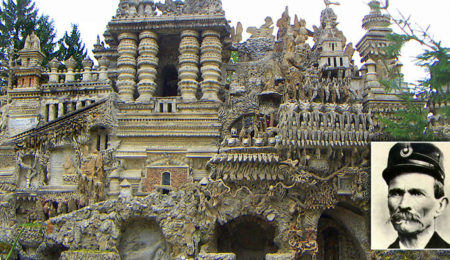
Born in a small French commune in the Drôme département and belonging to a poor peasant family, Ferdinand Cheval dropped out of school at the age of 13 to become a baker’s apprentice. After years of apprenticeship, he became a postman and was posted to Hauterives where a benign accident led to the creation of something so fantastical it intrigued even Picasso. His work is considered a remarkable example of naïve art architecture, art that is created by someone with no formal training like the art by French post-impressionist painter Henri Rousseau. Here’s more about Ferdinand Cheval and his labor of love, the Palais Idéal.
1 In April 1879, while doing his rounds, 43-year-old Ferdinand Cheval tripped over an unusual-looking stone and almost fell. He pocketed the stone and when he came back the next day he found many even more interesting stones.Ferdinand Cheval and His Family. Image Source: wikipedia, facteurcheval 2 Inspiration struck him when he saw the stones. So, every day while doing his rounds of about 29 kilometers (18 miles), he would pick up stones, put them in his pocket, and take them home.
Palais Idéal East Facade. Image Source: Benoît Prieur 3 Cheval soon had to switch to using a basket and then to a wheelbarrow to carry the stones.
Palais Idéal South Facade. Image Source: Eric Bajart 4 For 33 years, he continued collecting the stones and at home, in the night, he would build his Palais Idéal by the light of an oil lamp despite the ridicule and criticism he faced from neighbors.
Palais Idéal North Facade. Image Source: Marine69 5 He spent the first 20 years building the outer walls and the outer sculptures, binding the stones with lime, mortar, and cement.
Palais Idéal West Facade. Image Source: Daderot 6 The Palais Idéal is a mixture of different architectural styles drawing inspiration from various religions including Christianity and Hinduism.
Palais Idéal West Facade Detail. Image Source: Marine69 7 The palace is populated by many animals including octopus, caiman, elephant, bear, and birds, as well as fantastical creatures such as giants and fairies. It also features mythical creatures.
Palais Idéal West Facade Detail. Image Source: Marine69 8 In 1894, while still working on the outer walls, his 15-year-old daughter, Alice, died.
Palais Idéal North Facade Detail. Image Source: Daderot 9 In 1896, 60-year-old Cheval, now retired, started his second building project near the palace with the help of a mason. He named it the Alicius Villa and dedicated it to his daughter.
Palais Idéal North Facade Detail, Adam and Eve. Image Source: Otourly 10 By 1912, Cheval finished building his palace as another tragedy struck him in the form of his son Cyril’s death. Two years later his wife died too.
Palais Idéal North Facade Grotto Detail, Animals. Image Source: Daderot 11 He received recognition for the palace from eminent personalities like French poet, writer, and founder of surrealism André Breton, Spanish painter Pablo Picasso, German artist Max Ernst who created a collage called The Postman Cheval in 1932, and by American writer Anaïs Nin.
Palais Idéal Detail, Temple Hindou. Image Source: wikipedia 12 Cheval wanted to be buried in his Palais Ideal when he died but was denied permission.
Palais Idéal North Facade Detail. Image Source: wikipedia 13 So, he spent the next eight years building a mausoleum for himself called The Tomb of Silence and Endless Rest in the Hauterives Cemetery and finished it in 1922.
Palais Idéal Detail, Maison Blanche. Image Source: Marine69 14 He died on August 19, 1924, at the age of 88 and was buried in the mausoleum he built for his burial.
Palais Idéal Detail. Image Source: Arie M. den Toom 15 Ferdinand Cheval’s Palais Idéal was declared a cultural landmark in 1969 by André Malraux, the Minister of Culture. His tomb and Alicius Villa are also registered as historic monuments.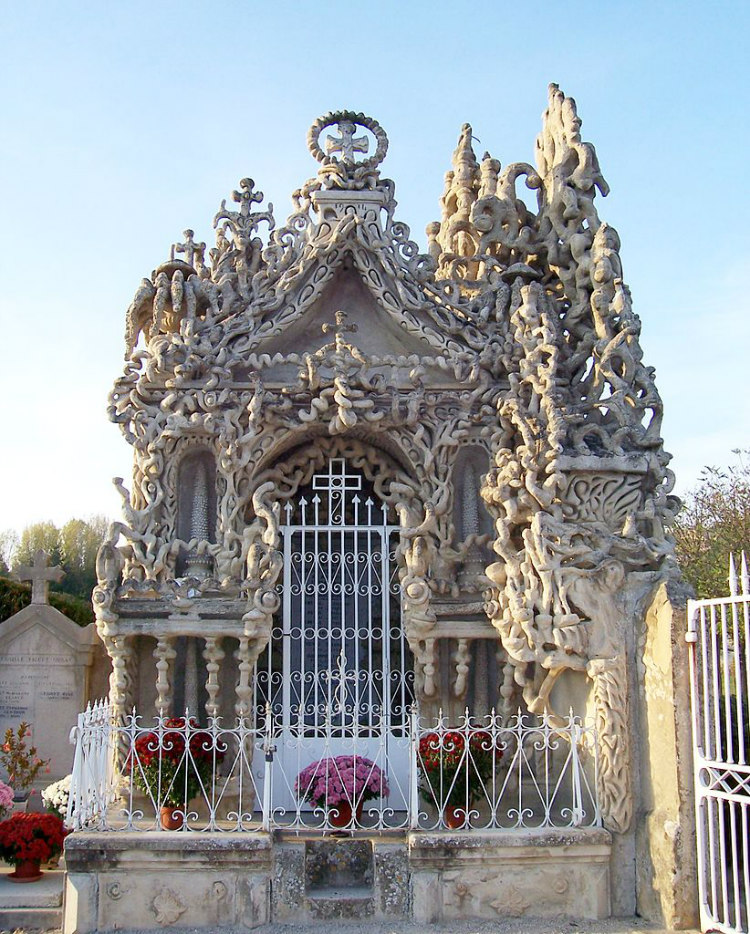
The Tomb of Silence and Endless Rest. Image Source: Wikilug

3 Cheval soon had to switch to using a basket and then to a wheelbarrow to carry the stones.
Palais Idéal South Facade. Image Source: Eric Bajart 4 For 33 years, he continued collecting the stones and at home, in the night, he would build his Palais Idéal by the light of an oil lamp despite the ridicule and criticism he faced from neighbors.
Palais Idéal North Facade. Image Source: Marine69 5 He spent the first 20 years building the outer walls and the outer sculptures, binding the stones with lime, mortar, and cement.
Palais Idéal West Facade. Image Source: Daderot 6 The Palais Idéal is a mixture of different architectural styles drawing inspiration from various religions including Christianity and Hinduism.
Palais Idéal West Facade Detail. Image Source: Marine69 7 The palace is populated by many animals including octopus, caiman, elephant, bear, and birds, as well as fantastical creatures such as giants and fairies. It also features mythical creatures.
Palais Idéal West Facade Detail. Image Source: Marine69 8 In 1894, while still working on the outer walls, his 15-year-old daughter, Alice, died.
Palais Idéal North Facade Detail. Image Source: Daderot 9 In 1896, 60-year-old Cheval, now retired, started his second building project near the palace with the help of a mason. He named it the Alicius Villa and dedicated it to his daughter.
Palais Idéal North Facade Detail, Adam and Eve. Image Source: Otourly 10 By 1912, Cheval finished building his palace as another tragedy struck him in the form of his son Cyril’s death. Two years later his wife died too.
Palais Idéal North Facade Grotto Detail, Animals. Image Source: Daderot 11 He received recognition for the palace from eminent personalities like French poet, writer, and founder of surrealism André Breton, Spanish painter Pablo Picasso, German artist Max Ernst who created a collage called The Postman Cheval in 1932, and by American writer Anaïs Nin.
Palais Idéal Detail, Temple Hindou. Image Source: wikipedia 12 Cheval wanted to be buried in his Palais Ideal when he died but was denied permission.
Palais Idéal North Facade Detail. Image Source: wikipedia 13 So, he spent the next eight years building a mausoleum for himself called The Tomb of Silence and Endless Rest in the Hauterives Cemetery and finished it in 1922.
Palais Idéal Detail, Maison Blanche. Image Source: Marine69 14 He died on August 19, 1924, at the age of 88 and was buried in the mausoleum he built for his burial.
Palais Idéal Detail. Image Source: Arie M. den Toom 15 Ferdinand Cheval’s Palais Idéal was declared a cultural landmark in 1969 by André Malraux, the Minister of Culture. His tomb and Alicius Villa are also registered as historic monuments.
The Tomb of Silence and Endless Rest. Image Source: Wikilug


5 He spent the first 20 years building the outer walls and the outer sculptures, binding the stones with lime, mortar, and cement.
Palais Idéal West Facade. Image Source: Daderot 6 The Palais Idéal is a mixture of different architectural styles drawing inspiration from various religions including Christianity and Hinduism.
Palais Idéal West Facade Detail. Image Source: Marine69 7 The palace is populated by many animals including octopus, caiman, elephant, bear, and birds, as well as fantastical creatures such as giants and fairies. It also features mythical creatures.
Palais Idéal West Facade Detail. Image Source: Marine69 8 In 1894, while still working on the outer walls, his 15-year-old daughter, Alice, died.
Palais Idéal North Facade Detail. Image Source: Daderot 9 In 1896, 60-year-old Cheval, now retired, started his second building project near the palace with the help of a mason. He named it the Alicius Villa and dedicated it to his daughter.
Palais Idéal North Facade Detail, Adam and Eve. Image Source: Otourly 10 By 1912, Cheval finished building his palace as another tragedy struck him in the form of his son Cyril’s death. Two years later his wife died too.
Palais Idéal North Facade Grotto Detail, Animals. Image Source: Daderot 11 He received recognition for the palace from eminent personalities like French poet, writer, and founder of surrealism André Breton, Spanish painter Pablo Picasso, German artist Max Ernst who created a collage called The Postman Cheval in 1932, and by American writer Anaïs Nin.
Palais Idéal Detail, Temple Hindou. Image Source: wikipedia 12 Cheval wanted to be buried in his Palais Ideal when he died but was denied permission.
Palais Idéal North Facade Detail. Image Source: wikipedia 13 So, he spent the next eight years building a mausoleum for himself called The Tomb of Silence and Endless Rest in the Hauterives Cemetery and finished it in 1922.
Palais Idéal Detail, Maison Blanche. Image Source: Marine69 14 He died on August 19, 1924, at the age of 88 and was buried in the mausoleum he built for his burial.
Palais Idéal Detail. Image Source: Arie M. den Toom 15 Ferdinand Cheval’s Palais Idéal was declared a cultural landmark in 1969 by André Malraux, the Minister of Culture. His tomb and Alicius Villa are also registered as historic monuments.
The Tomb of Silence and Endless Rest. Image Source: Wikilug


7 The palace is populated by many animals including octopus, caiman, elephant, bear, and birds, as well as fantastical creatures such as giants and fairies. It also features mythical creatures.
Palais Idéal West Facade Detail. Image Source: Marine69 8 In 1894, while still working on the outer walls, his 15-year-old daughter, Alice, died.
Palais Idéal North Facade Detail. Image Source: Daderot 9 In 1896, 60-year-old Cheval, now retired, started his second building project near the palace with the help of a mason. He named it the Alicius Villa and dedicated it to his daughter.
Palais Idéal North Facade Detail, Adam and Eve. Image Source: Otourly 10 By 1912, Cheval finished building his palace as another tragedy struck him in the form of his son Cyril’s death. Two years later his wife died too.
Palais Idéal North Facade Grotto Detail, Animals. Image Source: Daderot 11 He received recognition for the palace from eminent personalities like French poet, writer, and founder of surrealism André Breton, Spanish painter Pablo Picasso, German artist Max Ernst who created a collage called The Postman Cheval in 1932, and by American writer Anaïs Nin.
Palais Idéal Detail, Temple Hindou. Image Source: wikipedia 12 Cheval wanted to be buried in his Palais Ideal when he died but was denied permission.
Palais Idéal North Facade Detail. Image Source: wikipedia 13 So, he spent the next eight years building a mausoleum for himself called The Tomb of Silence and Endless Rest in the Hauterives Cemetery and finished it in 1922.
Palais Idéal Detail, Maison Blanche. Image Source: Marine69 14 He died on August 19, 1924, at the age of 88 and was buried in the mausoleum he built for his burial.
Palais Idéal Detail. Image Source: Arie M. den Toom 15 Ferdinand Cheval’s Palais Idéal was declared a cultural landmark in 1969 by André Malraux, the Minister of Culture. His tomb and Alicius Villa are also registered as historic monuments.
The Tomb of Silence and Endless Rest. Image Source: Wikilug


9 In 1896, 60-year-old Cheval, now retired, started his second building project near the palace with the help of a mason. He named it the Alicius Villa and dedicated it to his daughter.
Palais Idéal North Facade Detail, Adam and Eve. Image Source: Otourly 10 By 1912, Cheval finished building his palace as another tragedy struck him in the form of his son Cyril’s death. Two years later his wife died too.
Palais Idéal North Facade Grotto Detail, Animals. Image Source: Daderot 11 He received recognition for the palace from eminent personalities like French poet, writer, and founder of surrealism André Breton, Spanish painter Pablo Picasso, German artist Max Ernst who created a collage called The Postman Cheval in 1932, and by American writer Anaïs Nin.
Palais Idéal Detail, Temple Hindou. Image Source: wikipedia 12 Cheval wanted to be buried in his Palais Ideal when he died but was denied permission.
Palais Idéal North Facade Detail. Image Source: wikipedia 13 So, he spent the next eight years building a mausoleum for himself called The Tomb of Silence and Endless Rest in the Hauterives Cemetery and finished it in 1922.
Palais Idéal Detail, Maison Blanche. Image Source: Marine69 14 He died on August 19, 1924, at the age of 88 and was buried in the mausoleum he built for his burial.
Palais Idéal Detail. Image Source: Arie M. den Toom 15 Ferdinand Cheval’s Palais Idéal was declared a cultural landmark in 1969 by André Malraux, the Minister of Culture. His tomb and Alicius Villa are also registered as historic monuments.
The Tomb of Silence and Endless Rest. Image Source: Wikilug


11 He received recognition for the palace from eminent personalities like French poet, writer, and founder of surrealism André Breton, Spanish painter Pablo Picasso, German artist Max Ernst who created a collage called The Postman Cheval in 1932, and by American writer Anaïs Nin.
Palais Idéal Detail, Temple Hindou. Image Source: wikipedia 12 Cheval wanted to be buried in his Palais Ideal when he died but was denied permission.
Palais Idéal North Facade Detail. Image Source: wikipedia 13 So, he spent the next eight years building a mausoleum for himself called The Tomb of Silence and Endless Rest in the Hauterives Cemetery and finished it in 1922.
Palais Idéal Detail, Maison Blanche. Image Source: Marine69 14 He died on August 19, 1924, at the age of 88 and was buried in the mausoleum he built for his burial.
Palais Idéal Detail. Image Source: Arie M. den Toom 15 Ferdinand Cheval’s Palais Idéal was declared a cultural landmark in 1969 by André Malraux, the Minister of Culture. His tomb and Alicius Villa are also registered as historic monuments.
The Tomb of Silence and Endless Rest. Image Source: Wikilug


13 So, he spent the next eight years building a mausoleum for himself called The Tomb of Silence and Endless Rest in the Hauterives Cemetery and finished it in 1922.
Palais Idéal Detail, Maison Blanche. Image Source: Marine69 14 He died on August 19, 1924, at the age of 88 and was buried in the mausoleum he built for his burial.
Palais Idéal Detail. Image Source: Arie M. den Toom 15 Ferdinand Cheval’s Palais Idéal was declared a cultural landmark in 1969 by André Malraux, the Minister of Culture. His tomb and Alicius Villa are also registered as historic monuments.
The Tomb of Silence and Endless Rest. Image Source: Wikilug


15 Ferdinand Cheval’s Palais Idéal was declared a cultural landmark in 1969 by André Malraux, the Minister of Culture. His tomb and Alicius Villa are also registered as historic monuments.
The Tomb of Silence and Endless Rest. Image Source: Wikilug

[Sources: Wikipedia, FacteurCheval, AtlasObscura]
You May Also Like
OUR RECENT VIDEOS ![Picture]()
![Picture]()
![Picture]()
![Picture]()
![Picture]()
![Picture]()
![Picture]()
![Picture]()
background
10 of the Weirdest Birds You Never Knew Existed 
background
10 Unbelievable Facts About Space 
background
This Is What Everyday Foods Look Like Before they Are Harvested 
background
The Mysterious Disappearance Of The Sri Lankan Handball Team 
background
How Were Dinosaur Fossils Not Discovered Until The 1800s? 
background
Why Does Time Go Faster As We Grow Older? 
background
Why Aren’t Planes Getting Faster? 
background
10 Events That Can Wipe Out Humanity 






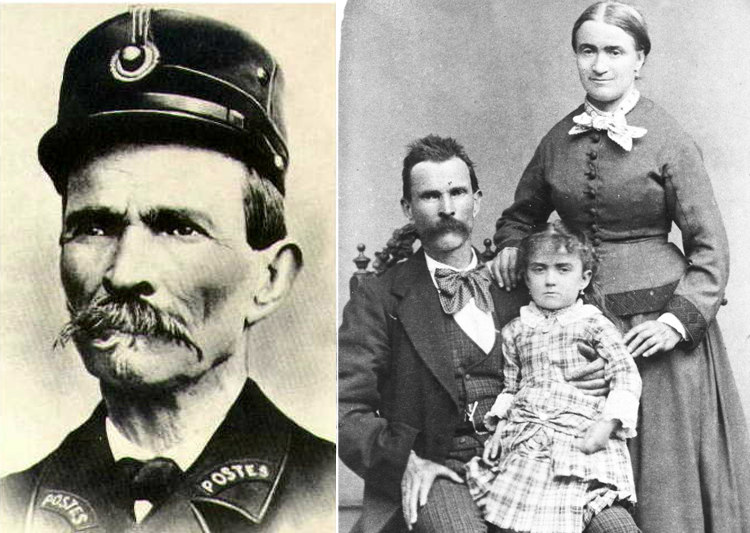

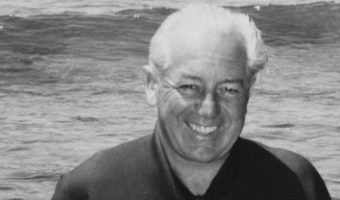

![Picture Before His Death, Lockheed Senior & Former Area 51 Scientist Claimed Aliens, UFOs exist. Pictures Shown As Proof [Video]](https://unbelievable-facts.com/wp-content/uploads/2014/11/snap-340x200-c-default.jpg)




